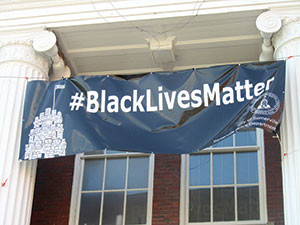
Residents and city officials have been coming together for discussions on race and racism as the Community Conversations Series continues throughout the month of October.
By Mellow D.
Throughout October Somerville has been hosting the Community Conversations Series where residents are encouraged to attend and share their “experiences, concerns, and ideas.”
The reoccurring “conversations” are organized by the Office of Health and Human Services and is nothing new to Somerville, as they have been organized since the 1990’s. The topics of discussion always change and in this round, they tackled the topic of race and racism.
The City of Somerville organized the Community Conversations Series with the intention of addressing issues needing attention in our community. Racism was chosen because “it’s a critical moment in time to talk about it” according to Denise Taylor, the City of Somerville’s Director of Communications and Community Engagement, as we discussed how the Community Conversations Series was going. Mayor Curtatone has expressed that “we, as a city, must do our part to move the national conversation on race forward.” The series is doing just that.
Debate revolved around the Black Lives Matter banner at City Hall. It was clear over the course of several meetings, that some agreed with having the banner up and others disagreed. The point all agreed on was that the banner inspired and sparked discussion amongst residents.
The #BlackLivesMatter movement defines itself as “a chapter-based national organization working for the validity of Black life… working to (re)build the Black liberation movement.” It is important to note that the statement “Black Lives Matter” does not nullify the importance of other races or other lives, but rather is drawing attention to the very apparent systematic and individualized racism that exists here in our country.
A subject brought to light in the Community Conversations Series was the history of New England and its involvement in the Atlantic Slave Trade, as revealed in the book Ten Hills: The Forgotten History of Slavery in the North. The book recounts five generations of slavery in New England through original documents such as letters, shipping records, and newspaper articles from the 1600’s onward. While it can be easy to think slavery was solely “a southern thing,” we, as New Englanders, need to realize our communities were also founded and developed under racist ideologies. We, as Somerville residents, are not immune to racism.
Over the decades, Somerville Community Conversations have served as a place for city employees to hear from the public and even as a middle ground to bring residents together to engage in conversation about various matters. A common shared feeling in the series is that it gave residents a starting place for conversation on race and racism. Throughout the meetings, residents widely felt they were carrying the topic outside of the series setting. Many shared having this historically difficult conversation in their homes, at work, school and even in line at the grocery store. The most important fact is, that regardless of one’s perspective on race and racism, the discussion about it is becoming more and more communal.
As expressed by David Krass, the director of the Health and Human Services Department of Somerville, “The [Community Conversations Series are] not a one-time solution.”
According to Krass, discussion on its own, is not a solution. The conversation about race and racism needs to transform into a plan and we need to put it into action. The question to now tackle is what do we do as a community to free ourselves of systematic and individual racism? It starts with each of us as individuals educating and informing ourselves about the history and ideology of race and racism as well as continuing to share our experiences as neighbors, friends and family. Only then, with knowledge and perspective, will we empower ourselves to create and nurture a community we all believe in.















Reader Comments